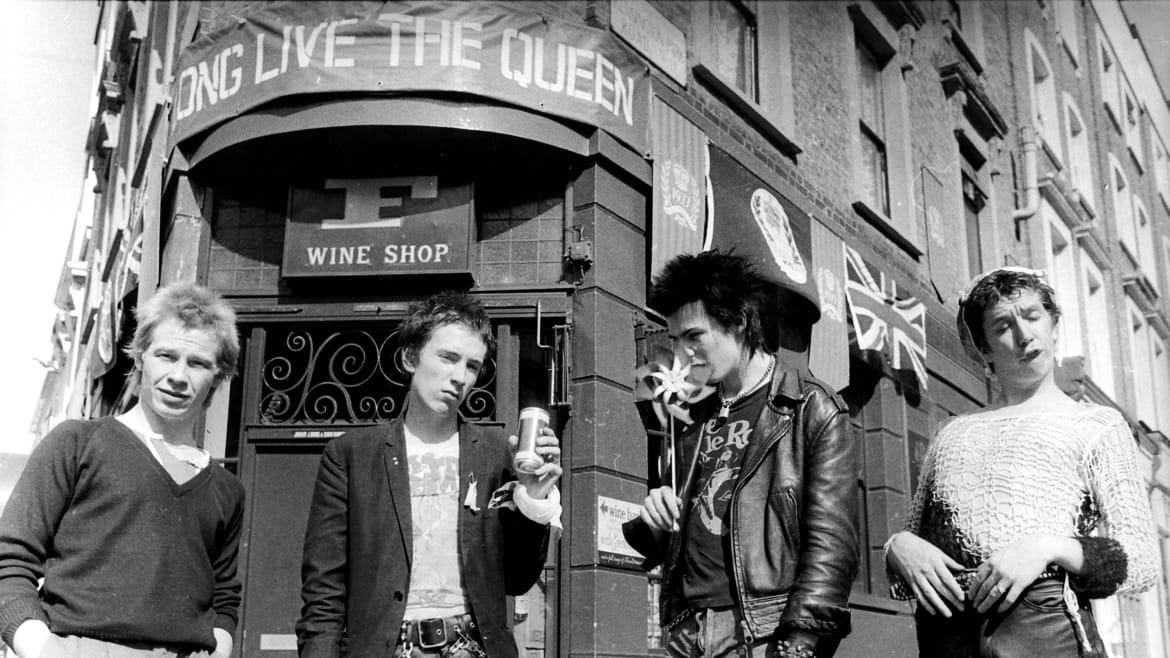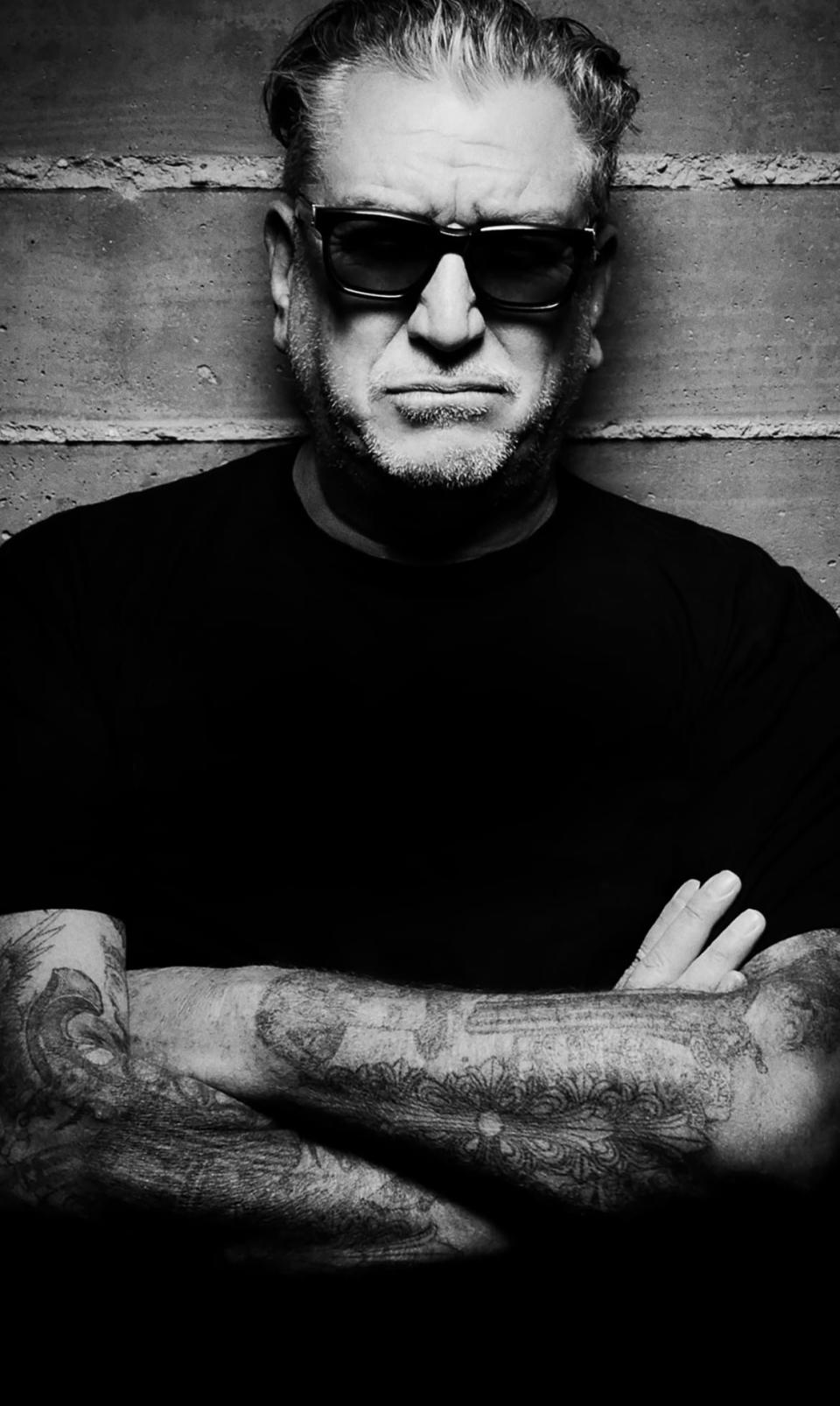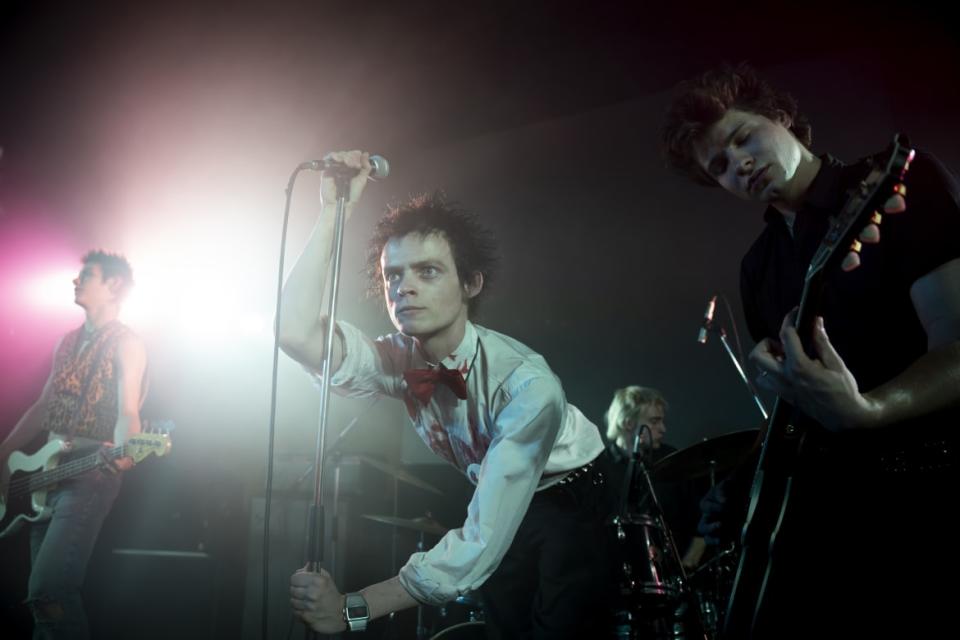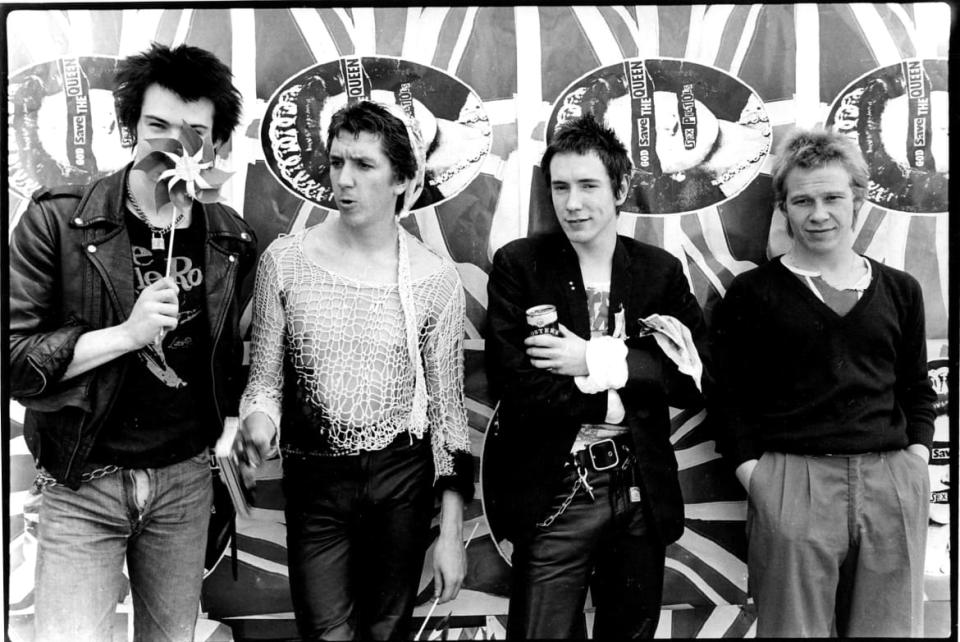The Sex Pistols’ Steve Jones Looks Back on the Punk Mayhem of ‘Pistol’

- Oops!Something went wrong.Please try again later.
- Oops!Something went wrong.Please try again later.
- Oops!Something went wrong.Please try again later.
The first time I crossed paths with Steve Jones was in the early ’80s. He was already well into his post-Sex Pistols career, but the legend of that band loomed large. Still, as Anson Boon, who plays Johnny Rotten in Pistol, the new FX limited series directed by Danny Boyle, says, Jones was just part of “my backing band” and it was Rotten who was “the star.” In my teenage eyes, at least, there was more than a little truth in that.
Rotten was, of course, an irresistible frontman, and had an amazing run, as John Lydon, with his band Public Image Ltd. in the wake of the Pistols’ demise. And—regardless of some of his recent attention-seeking antics—his books are must-reads for any fan of the band, or the era. But time has a funny way of leveling the playing field, and now it’s Steve Jones who not only carries the torch for his former band with pride, but is also a renowned radio host, a hit podcaster, and bona fide Rock & Roll Hall of Fame guitar-slinging legend. He’s also the best-selling author of 2017’s Lonely Boy, probably the best—and certainly the most honest—rock and roll memoir. And that’s where Pistol comes in. Adapted from Jones’ book, the six-part series chronicles the chaotic, brief life of the Sex Pistols and the London punk scene of which the band was the epicenter. It also tells the tale of the tumultuous relationship between the bandmembers and their anarchic manager, Malcolm McLaren, and his partner, Vivienne Westwood, whose shop SEX was ground zero for punk in mid-’70s London.
For all Lydon’s bluster about Pistol being a “middle-class fantasy”—and worse—Boon’s turn is beyond respectful. In fact, Jones himself is one of his partner’s biggest fans, so it’s no surprise that, next to Jones himself, Lydon is seen as the crucial spark that made the Pistols what they were.
Danny Boyle Takes Us Inside ‘Pistol,’ His Chaotic and Brilliant Sex Pistols Series
But if there’s any real surprise in Pistol, it’s the remarkable turn by newcomer Sydney Chandler as Chrissie Hynde, the future-Pretender and intimate of Jones at the time. The relationship between Jones, played by Toby Wallace, and Chandler’s Hynde is what elevates Pistol beyond your average rock and roll tale.
Below, the real Steve Jones discusses bringing Pistol to the small screen, his relationship with Lydon, Pistols drummer Paul Cook, and bassist Glen Matlock—whose studio recordings have been collected in a great-sounding new release, Sex Pistols: The Original Recordings—his recent health scares, and more.
You had some health issues over the past year or two. How are you doing?
I’m doing good. But yeah, I wasn’t looking after myself, if I’m honest. I didn’t give a shit. I just ate whatever I wanted. I was well overweight. I went to the doctors and they were like, “You need to take blood pressure pills. You need to get on meds for diabetes.” And I never did it. Eventually, it came back, kicked me in the ass. It was a big wakeup call, that’s for sure.
And what about Generation Sex, your band with Billy Idol and Tony James from Generation X and fellow Sex Pistol Paul Cook? I saw you before the pandemic and it was amazing. Are there any plans to do anything with that?
Yeah, we’re definitely planning on doing something. Billy’s into it, I’m into it, Cookie’s into it, Tony James is into it. Nothing is planned at this moment, but I think it will be soon enough.
OK, let’s talk about Pistol. Danny Boyle was a great choice as director. I can’t imagine anybody else who could have pulled off your book for television than Danny Boyle.
It was surreal that he was interested in doing it, to be honest. I mean, originally, we were looking for a director to do a movie. It wasn’t originally conceived as a TV show. We had a few bites here and there, but nothing we were excited about, really. And then, all of a sudden, we got the writer Craig Pearce involved. He came and visited me in L.A., we hung out and then we did some Skypes, and from the book and that he wrote a lot of it, and that got Dan’s interest. And who’s going to turn that down, when Danny Boyle wants to do your book? That’s why I fought for having our songs in it when John was not wanting to play ball. I wasn’t going to roll over for this one. Why should I? They’re my songs, too!

Steve Jones of the Sex Pistols.
And music is so crucial to Danny’s work—in some ways just as important as the visuals.
Absolutely. I mean, you’ve seen the documentaries—the cheap budget ones where they don’t have the real songs, it’s the worst! Can you imagine not having Sex Pistols songs in this show?
It’s like the Hendrix movie with Andre 3000 that they made a few years ago. Andre certainly could’ve been great, but no Hendrix music, no movie.
Yeah. It’s as simple as that.
Did you see the Telegraph review? In a sea of positive reviews, it was very negative. It was as though he saw a completely different show from the rest of us. He seemed to think it was a great disservice to John, but I didn’t get that at all.
Yeah, our manager seems to think it was by a guy who’s in John’s camp. [Laughs]
From your perspective, and I don’t want to make things worse…
Listen, every interview I’ve been doing for the last three weeks, all they want to talk about is what John’s been saying. I get it.
Well, I want to give you the opportunity to tell it from your point of view. As you said, you could not have told this story without actual Sex Pistols music, the same as how the scenes that feature Hawkwind or Bowie wouldn’t have worked the same way without those tunes. But tell me a little about why it was so important to you? I mean, the recordings are largely you and Cookie, so…
Yeah. And some of the tunes. There’s a good half of the songs that was my music. And Glen was the other half. And, of course, most of the lyrics were John.

Pistol stars Louis Partridge as Sid Vicious, Anson Boon as John Lyndon, and Toby Wallace as Steve Jones.
But why did things break down to the point they did? It seems like something that didn’t need to go as far as it did, ending up in court and all.
It didn’t need to go that way. But when John was approached to be involved in it, he wasn’t interested. He claims he didn’t know… blah, blah, blah. But that’s not true. He did. And I wasn’t surprised when he came back with, you know, well, “I’m outraged,” or whatever he came out with. Whereas, if it was me, and the shoe was on the other foot, and Danny Boyle wanted to do a show based on John’s book, I wouldn’t have had a problem. I would’ve been thrilled. It’s only good for everybody. We’re 65, 66 years old. What’s the problem? So, I don’t know why John chose to go down the road he did. We’ve always had disagreements, because we’ve always been majority rules. And we don’t want to rock the boat. We want to try and keep everybody smooth. But I wasn’t just going to roll over and let it disappear. It was too big of a deal.
Have you reached out to him? Have you tried to mend fences? Has he seen the show, do you know?
I don’t know if he has. But no, I haven’t spoke to John since 2008 when we did some shows together, even though we basically live in the same city. I’m OK with it, though, and I totally have mucho respect for John, for what we did back then, and as an artist, but I don’t know why he does all the press about why he doesn’t agree, “I wasn’t informed,” all this stuff. I don’t know. And plus, he’s doing some PIL show, so the show’s only good for him, as well.
Your book is still my favorite rock and roll memoir, but it is not really just a rock and roll memoir. It’s a lot more than that. It’s about the time and place; it’s about coming of age in Britain in that period, and also, about the pretty harrowing childhood you had. Did you have any qualms about revisiting all that and putting it on the screen? Because for people who are just casual fans, it’s a lot of information. You had a crazy life before the Pistols.
Yeah. But you know what, at this point, it’s not a secret. I’m totally comfortable with my past, and I had no problem letting people know about it.
And seeing it on the screen—like the scenes of abuse—were you there on set when they were shooting?
No, I wasn’t there. I didn’t go to England when they were shooting it, which was when COVID was full-blown. I didn’t want to go over there and deal with all that. But I would get rough cuts and I thought it was great. I actually got a bit teary-eyed in some of the scenes.
What made you teary-eyed? You’re such a softie.
I’m not telling. I am a softie!
I know you are. People think you’re a hard-ass but you’re not at all.
No, I’m not. But don’t tell anybody.
All right, I’ll cut that part out. We don’t want anybody thinking you’re a softie.
I’m kidding. I don’t care.
Let’s go back a little bit. It’s your story. That’s why you wanted Danny. That’s why you fought John to use the music. How important was it to you that the story was told? It’s a great story, but it’s a story that people who are not Sex Pistols fans will definitely be able to relate to, and it might even make them fans. So, how involved were you in working with Craig Pearce, the writer, and Danny on the arc of the story?
I let them do their thing, man. I don’t like the concept of too many cooks in the kitchen. It makes it worse when there’s too many people talking about what they think it should be. I totally trusted Danny Boyle and Craig Pearce. They know what’s up. I really just get on with them. Mind you, there was some stuff I saw, not just about me, but of the guys playing music, that bugged me. That needed a bit of work, so it actually looked like a band playing. But I pretty much stayed out of the way.
Were you in contact with Cookie and Glen and how they felt about it? Were they involved at all?
Not for a long time. Only near the end they got involved. They went to the set early on, Glen and Paul and Chrissie Hynde and a few other people, but it took a while for them to actually see rough cuts.
And what did Chrissie think? Because what I love about the series is that it shows the women in that universe, and how really important they were to it. They’re not just bystanders. They are significant to the story, and they have their own stories, and those are told.
Yeah, definitely. I mean, you’ve got Siouxsie, Jordan, Catwoman, Chrissie, because back in the day, the women were really crucial to the early punk scene, and there was a few bands—Penetration, the Adverts, the Pretenders, obviously—so it’s good to have all that in there. And the love interest with me and Chrissie was great. Was that accurate? It was a little bit showbiz-y. But look at the big picture. Don’t look at it as a documentary. Just look at it as a TV show that’s there to entertain. But it’s a good thing to have all the way through it.
Is that what you told her after she saw it? Have you talked to Chrissie since she’s seen it? Because she’s an opinionated woman.
Yeah, we texted a bit after she saw it. We texted throughout—from the beginning to the end—and then she FaceTimed me with the girl who’s playing her, Sydney Chandler, who does a brilliant job. She’s an unknown too. Or pretty much. She did a great job. But Chrissie texted me after she saw the sixth episode, and she thought it was really good, though she was shocked how much she was in it. She had no idea she was going to be in it as much as that. But she gave it two thumbs up.
Ultimately, it’s story about the Pistols, but it’s also a story about England during that time. I think for many American viewers, it’s going to be eye-opening. It was bleak in ’75, ’76, wasn’t it?
It was, but I didn’t see that bleakness. For me, everything was a giggle. I didn’t care. I was having a great time around London at that time. I didn’t notice trash bags everywhere and all that. What was bleak was my upbringing. That was what was bleak, in that home with my stepfather and my mother. Everything else was just a giggle after that.

The Sex Pistols in their heyday.
There’s a great scene where Malcolm comes into the courtroom and gives this amazing speech, after you’ve been arrested and are facing real jail time. I’ve got to imagine—like you said about love interest with Chrissie—that it’s got to be television hyperbole. But do you remember that day?
Well, this is bizarre, man. I have no recollection of that. I know it happened, but I must’ve just been so shut down, because I didn’t want to face the consequences—because I was probably going to go away to a proper prison—so I must have blacked it out. I’m an expert at blacking stuff out. I really have no recollection at all.
And yet, some of the truly excruciating things in your life you seem to have a pretty clear memory of.
Yeah, for sure. You can’t black everything out.
So, how close to this is the chaos that you guys were living back then?
There was definitely a period where it was just out of control. No doubt about it. You know, you couldn’t walk around…
But from the inside looking out, was it worse or better than it seemed to the public? Because from the outside, it seemed like constant chaos and constant headlines.
Well, you know, a lot of that was press just looking to keep their papers selling. But some of the real aggro and violence was in the early days when no one knew who we was, when we were playing in north of England in these weird places with these working-class guys flinging bottles at you and wanting to kill you. To me, that was the scary time. I mean, I’d throw up sometimes before I went and played. I was so nervous, knowing that we were not just going up to play music, but that we were going to have to avoid follies of bottles being slung at us.
So, the stuff with the Jubilee and Bill Grundy and all that, maybe that paled in comparison, because you weren’t physically in danger?
In hindsight, what was it, two, three years we were together? So, it was all pretty much a whirlwind. There wasn’t a lot of down time. But also, it was great for young guys. Would I want to do it again at this stage in the game? Not in a million years.
Get the Daily Beast's biggest scoops and scandals delivered right to your inbox. Sign up now.
Stay informed and gain unlimited access to the Daily Beast's unmatched reporting. Subscribe now.

